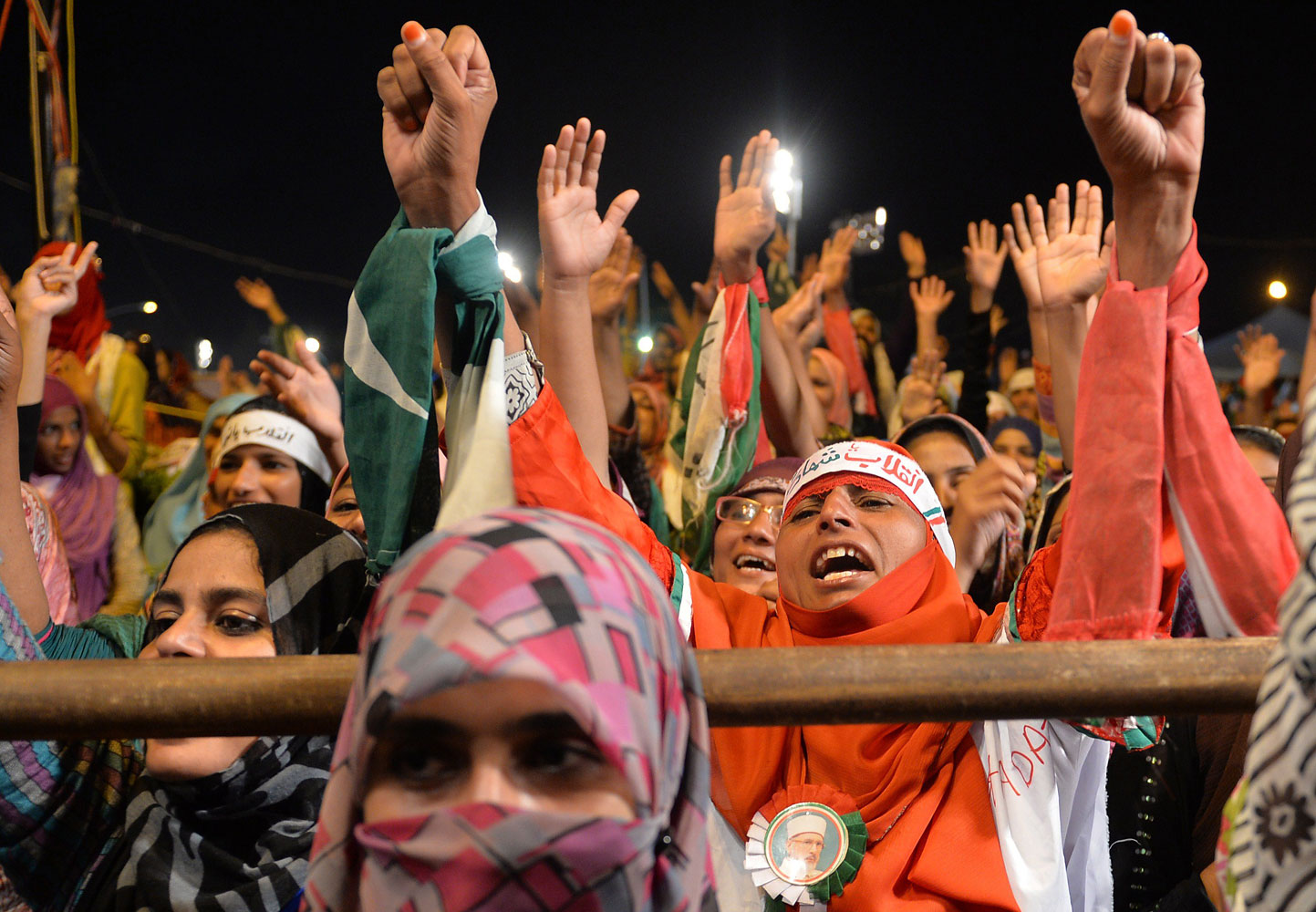
Just last May, Pakistan was celebrating its first ever successful transition from one elected government to another, after the completion of a full five-year term in office. Now, just 15 months after the last elections, hopes of democracy strengthening have dissipated after the country’s powerful army stepped in on Thursday night to assume a political role and mediate with anti-government protestors.
For over two weeks now, the Pakistani capital Islamabad has been paralyzed by tens of thousands of protestors led by the former cricket captain-turned-opposition leader Imran Khan and the prominent cleric Tahir ul-Qadri. The two groups insisted they were separate but led closely coordinated campaigns. Khan wanted Prime Minister Nawaz Sharif to resign, while Qadri has been insisting on a complete overhaul of the country’s political system as part of a self-styled “revolution.”
The government’s efforts to negotiate with the protestors repeatedly failed. Each time, Khan said that nothing short of the prime minister’s resignation would suffice. The former World Cup-winning cricket star claims that last year’s elections were systematically rigged to deny him victory—something the government strenuously denies. The European Union’s Election Observation Mission praised the 2013 elections as a demonstration of “strong democratic commitment,” in its July 2013 report, but added that “fundamental problems” remain in the electoral process that leave it “vulnerable to malpractice.”
Khan has become an increasingly polarizing figure in recent weeks: to his hardcore of supporters he is a rare, principled politician taking on a venal and inept political class; to his opponents he is a vain and reckless politician who is prepared to risk damaging democracy in pursuit of power. At the height of the protests, he incited his supporters to stop paying taxes and electricity bills as part of a “civil disobedience” campaign, and, in a flight of rhetoric, even seemed to be challenging Prime Minister Sharif to a duel.
Late on Thursday night, after weeks of holding out, Prime Minister Sharif asked Gen. Raheel Sharif (no relation) to negotiate a resolution to the crisis. The move seemed to underscore two abiding realities in Pakistan. The often squabbling civilians are still unable to resolve their differences among themselves, and that the true center of power remains the military’s headquarters in Rawalpindi.
There is no danger of the army taking over and imposing martial law. There appears to be little appetite for that in Pakistan, despite similar rollbacks of civilian rule over the last two years in Egypt and Thailand. But now the civilian government’s authority has been badly, if not fatally, weakened. Even if Prime Minister Sharif survives the current crisis, with his parliamentary majority intact, he will be hamstrung in his ability to implement many of his proposed reforms.
The Sharif government has scarcely helped itself, though. Prime Minister Sharif’s name was this week included among the accused in a police report looking into the killings of 14 protestors loyal to cleric Qadri in June, in the eastern city of Lahore. On that occasion, the notoriously heavy-handed Punjab police lived up to its reputation by assailing the crowds with tear gas and later opening fire. The prime minister isn’t likely to be tried for the incident, but his younger brother, Punjab Chief Minister Shahbaz Sharif, is facing intense pressure to step down now.
Although Prime Minister Sharif formally asked the army chief to step in, it is widely suggested that he did so reluctantly. The Punjabi industrialist-turned-leader of the conservative Pakistan Muslim League-Nawaz has a decades-old difficult relationship with Pakistan’s generals. Once a protégé of the former dictator Gen. Muhammad Zia-ul-Haq, Sharif turned against his mentors and has repeatedly clashed with every army chief during his two terms as prime minister in the 1990s. The last of those confrontations, in 1999, saw him overthrown in a military coup led by Gen. Pervez Musharraf.
Prime Minister Sharif’s current difficulties with the army appear to stretch back to his decision, soon after assuming office last year, to place Musharraf on trial for imposing a state of emergency in November 2007. His government’s other initiatives, including attempts at warmer ties with neighbors New Delhi and Kabul through an independent foreign policy, are believed to have chafed military leaders. Now, the army will likely play a more decisive role when it comes to Pakistan’s foreign and defense policies, relegating the civilians to the often messy and unpopular business of day-to-day governance.
Soon after it was announced that the army chief would step into mediate late on Thursday night, Khawaja Muhammad Asif, the defense minister and one of Prime Minister Sharif’s closest aides tried to gloss over the occasion by claiming that the army was merely playing “a constitutional role”. But another member of the Sharif cabinet was plainly dispirited by the sight of thousands on the street being able to imperil a national electoral mandate. A picture is worth a thousand words, tweeted Khurram Dastgir-Khan, the commerce minister, with an attached image. It was the movie poster for George Lucas’ Star Wars film, “The Empire Strikes Back.”
More Must-Reads from TIME
- Donald Trump Is TIME's 2024 Person of the Year
- Why We Chose Trump as Person of the Year
- Is Intermittent Fasting Good or Bad for You?
- The 100 Must-Read Books of 2024
- The 20 Best Christmas TV Episodes
- Column: If Optimism Feels Ridiculous Now, Try Hope
- The Future of Climate Action Is Trade Policy
- Merle Bombardieri Is Helping People Make the Baby Decision
Contact us at letters@time.com